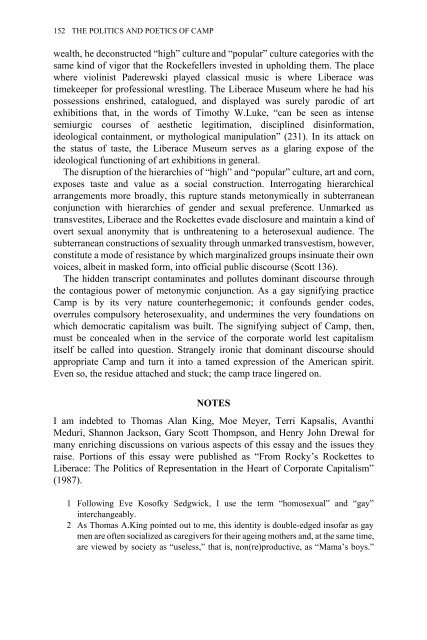Edited by Moe Meyer - Get a Free Blog
Edited by Moe Meyer - Get a Free Blog
Edited by Moe Meyer - Get a Free Blog
Create successful ePaper yourself
Turn your PDF publications into a flip-book with our unique Google optimized e-Paper software.
152 THE POLITICS AND POETICS OF CAMP<br />
wealth, he deconstructed “high” culture and “popular” culture categories with the<br />
same kind of vigor that the Rockefellers invested in upholding them. The place<br />
where violinist Paderewski played classical music is where Liberace was<br />
timekeeper for professional wrestling. The Liberace Museum where he had his<br />
possessions enshrined, catalogued, and displayed was surely parodic of art<br />
exhibitions that, in the words of Timothy W.Luke, “can be seen as intense<br />
semiurgic courses of aesthetic legitimation, disciplined disinformation,<br />
ideological containment, or mythological manipulation” (231). In its attack on<br />
the status of taste, the Liberace Museum serves as a glaring expose of the<br />
ideological functioning of art exhibitions in general.<br />
The disruption of the hierarchies of “high” and “popular” culture, art and corn,<br />
exposes taste and value as a social construction. Interrogating hierarchical<br />
arrangements more broadly, this rupture stands metonymically in subterranean<br />
conjunction with hierarchies of gender and sexual preference. Unmarked as<br />
transvestites, Liberace and the Rockettes evade disclosure and maintain a kind of<br />
overt sexual anonymity that is unthreatening to a heterosexual audience. The<br />
subterranean constructions of sexuality through unmarked transvestism, however,<br />
constitute a mode of resistance <strong>by</strong> which marginalized groups insinuate their own<br />
voices, albeit in masked form, into official public discourse (Scott 136).<br />
The hidden transcript contaminates and pollutes dominant discourse through<br />
the contagious power of metonymic conjunction. As a gay signifying practice<br />
Camp is <strong>by</strong> its very nature counterhegemonic; it confounds gender codes,<br />
overrules compulsory heterosexuality, and undermines the very foundations on<br />
which democratic capitalism was built. The signifying subject of Camp, then,<br />
must be concealed when in the service of the corporate world lest capitalism<br />
itself be called into question. Strangely ironic that dominant discourse should<br />
appropriate Camp and turn it into a tamed expression of the American spirit.<br />
Even so, the residue attached and stuck; the camp trace lingered on.<br />
NOTES<br />
I am indebted to Thomas Alan King, <strong>Moe</strong> <strong>Meyer</strong>, Terri Kapsalis, Avanthi<br />
Meduri, Shannon Jackson, Gary Scott Thompson, and Henry John Drewal for<br />
many enriching discussions on various aspects of this essay and the issues they<br />
raise. Portions of this essay were published as “From Rocky’s Rockettes to<br />
Liberace: The Politics of Representation in the Heart of Corporate Capitalism”<br />
(1987).<br />
1 Following Eve Kosofky Sedgwick, I use the term “homosexual” and “gay”<br />
interchangeably.<br />
2 As Thomas A.King pointed out to me, this identity is double-edged insofar as gay<br />
men are often socialized as caregivers for their ageing mothers and, at the same time,<br />
are viewed <strong>by</strong> society as “useless,” that is, non(re)productive, as “Mama’s boys.”


